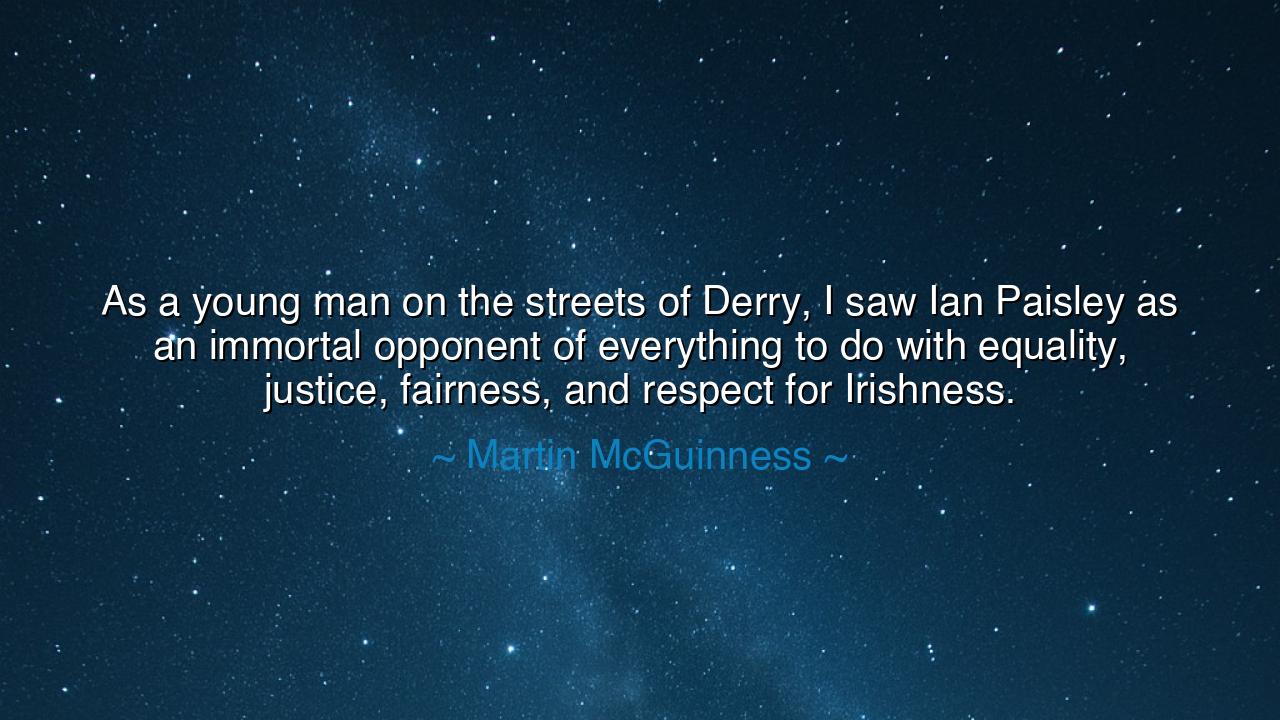
As a young man on the streets of Derry, I saw Ian Paisley as an
As a young man on the streets of Derry, I saw Ian Paisley as an immortal opponent of everything to do with equality, justice, fairness, and respect for Irishness.






Hear now, O students of history and seekers of peace, the words of Martin McGuinness, son of Derry and soldier of a divided land, who said: “As a young man on the streets of Derry, I saw Ian Paisley as an immortal opponent of everything to do with equality, justice, fairness, and respect for Irishness.” These words, forged in the fire of conflict and tempered by the wisdom of time, speak not only of enmity, but of the evolution of understanding — the journey from division toward reconciliation. For McGuinness, who had once seen his homeland torn between identities, religion, and power, knew the bitterness of strife and the longing for unity.
To understand his words, we must recall the time and the place. The city of Derry, in Northern Ireland, was then a crucible of turmoil — a place where walls divided neighbors and fear walked the streets like a living shadow. McGuinness was a young man in the late 1960s and early 1970s, when the cry for civil rights rose among Catholics and nationalists who sought the same equality and justice long denied them under British rule. But to those like Ian Paisley, the Protestant preacher and unionist leader, such demands were seen as threats — as challenges to the old order, to the dominance of one community over another. Thus, in McGuinness’s eyes, Paisley became the embodiment of resistance to all he held sacred: freedom, dignity, and the right to be Irish in one’s own land.
Yet these words are not merely condemnation; they are testimony to the fire of youth. For in his early years, McGuinness saw only the clash — the stark line dividing “us” and “them.” He saw Paisley not as a man, but as a symbol of oppression. The streets of Derry were not mere roads then; they were battlegrounds of identity. Marches for fairness were met with batons, protests with bullets, and the dream of peace seemed as distant as the stars. The young McGuinness, like many of his generation, was shaped by this crucible of injustice, and thus his vision of Paisley — “an immortal opponent” — was born not from hatred alone, but from the despair of a people who could not yet imagine friendship with their foes.
But time, that great teacher, softened even such iron certainties. For many years later, the world watched in wonder as these two men — Martin McGuinness and Ian Paisley, once enemies across barricades — sat side by side in government, laughing together as partners in peace. They were called “the Chuckle Brothers,” a title half in jest, half in awe, for none could have imagined such reconciliation. The young man who once saw an “immortal opponent” had come to see instead a fellow traveler in the long, painful journey toward understanding. McGuinness’s words, when read through this light, become not a curse but a confession — a remembrance of how far the human heart can travel when it chooses dialogue over division.
The story of McGuinness and Paisley is not merely Irish; it is universal. It teaches that even those we perceive as eternal adversaries may, through courage and humility, become partners in the work of healing. The equality, justice, fairness, and respect that McGuinness sought were not given by the sword but earned by the hand extended in peace. What began as the fury of resistance became, in the fullness of years, the wisdom of reconciliation. Their friendship, however brief, was the living proof that enemies are not destined to remain so — that the bridge from bitterness to brotherhood can indeed be built, stone by stone, by those brave enough to cross it.
And yet, his words remain a warning. For inequality and injustice, once thought vanquished, can return if vigilance fades. The young McGuinness who saw oppression on the streets of Derry speaks to every generation that rises after him: do not grow complacent in peace. Do not forget that fairness and respect must be continually renewed. When a people cease to see one another as human, when they cease to listen, the cycle of hatred begins anew. To remember the pain of division is to protect the future from it.
So, my listeners, take this teaching to heart. When you encounter those who stand against your cause, remember that opposition is not eternal; hearts can change, and history can heal. Seek justice, but do not lose your compassion in the struggle. Stand firm for equality, but remain open to the power of forgiveness. For the truest victory is not the defeat of your enemy, but the transformation of enmity into understanding.
Thus spoke Martin McGuinness, who journeyed from the fiery streets of Derry to the halls of peace in Stormont. His words remind us that every enemy is a teacher, every conflict a mirror, and every heart — no matter how hardened — carries within it the capacity for change. Let his life and his lesson endure: that the road from hatred to harmony, though long and steep, is the road by which humanity itself ascends toward wisdom.






AAdministratorAdministrator
Welcome, honored guests. Please leave a comment, we will respond soon